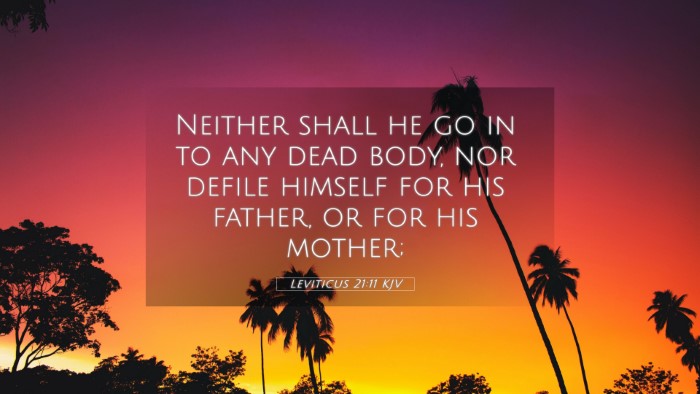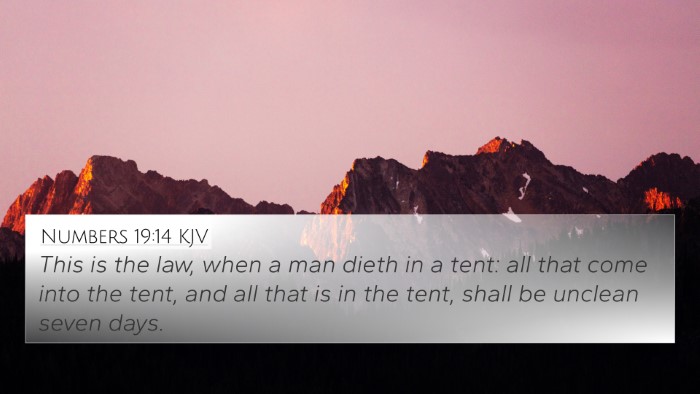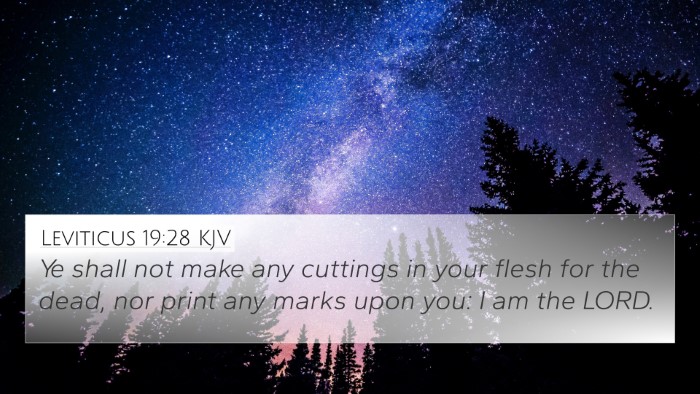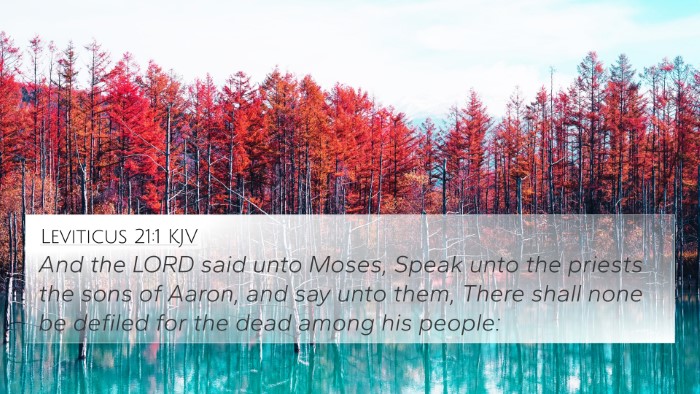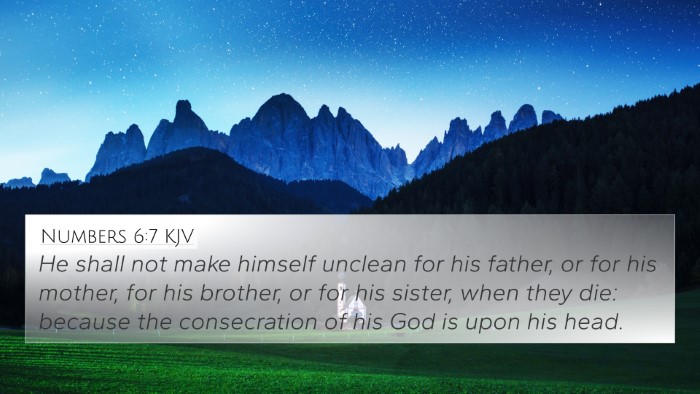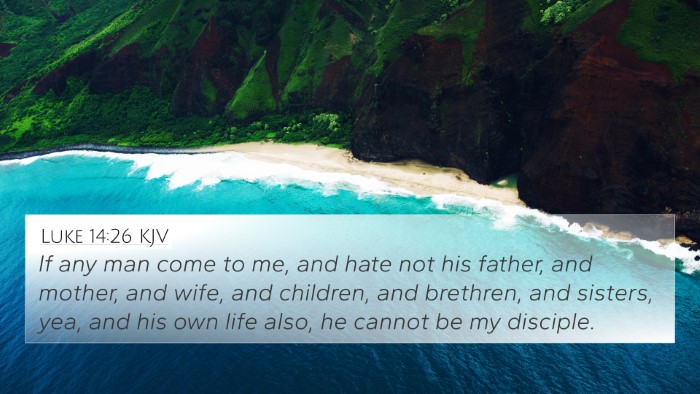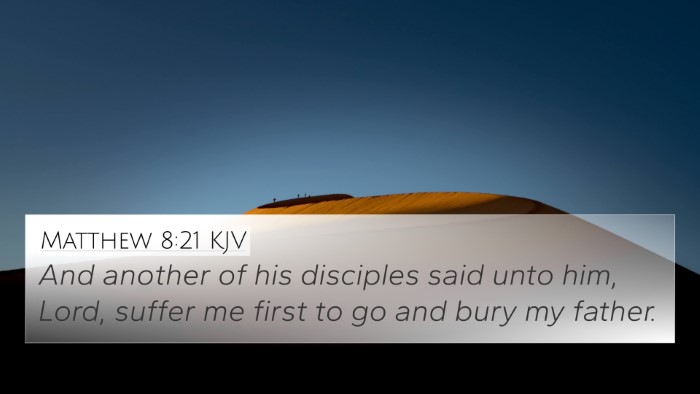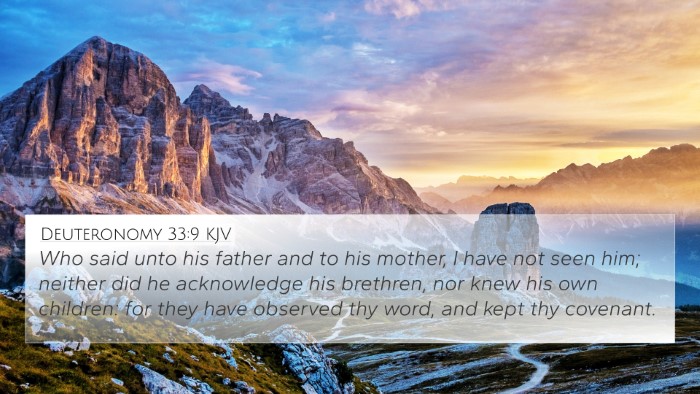Understanding Leviticus 21:11
Leviticus 21:11 states:
“Neither shall he go in to any dead body, nor defile himself for his father, or for his mother.”
This verse emanates from a larger context regarding the holiness required of the priests in Israel. Let us explore its meaning through insights from notable public domain commentaries.
Summary of Commentary Insights
- Matthew Henry: Henry emphasizes the importance of ceremonial purity for priests, reflecting their dedicated service to God. This prohibition of touching a dead body signifies a higher standard of holiness, stemming from the idea that priests must remain uncontaminated by death, which symbolizes sin and separation from God.
- Albert Barnes: Barnes provides that the instruction is not solely for physical defilement, but serves as a metaphor for spiritual purity. The call to avoid impurity underscores the priest's role, which is to maintain a connection with God and serve the people without hindrance.
- Adam Clarke: Clarke interprets the relationship between life, death, and the priestly office. He suggests that by avoiding contact with dead bodies, priests are tasked with embodying the life of God. This serves as an object lesson for the community, indicating the seriousness of spiritual leadership.
Thematic Connections
When interpreting Leviticus 21:11, we can identify several thematic linkages within the Bible:
- Hebrews 7:26-27: Discusses the perfection of Christ as high priest, emphasizing His sinless nature, which resonates with the demands placed on Old Testament priests.
- Ezekiel 44:23: Asserts that the priests are to teach the people about the differences between the holy and the profane, agreeing with the theme of holiness in Leviticus.
- 1 Peter 2:9: Identifies believers as a ‘royal priesthood,’ suggesting that the call to holiness extends to all Christians.
- Romans 12:1: Shares the idea of presenting our bodies as living sacrifices, paralleling the devotion expected from the priests.
- John 11:11: Jesus speaks of Lazarus’s death sleep, linking the concept of life and death with spiritual awakening, which is central to the priest's role.
- Revelation 1:6: Declares believers as priests to God, echoing the idea that spiritual purity is required for servant leadership.
- Luke 10:19: Jesus empowers His disciples to tread over spiritual death, indicative of their authority as a reflection of the priestly function.
Cross-Referencing the Context
To deeply understand the implications of Leviticus 21:11, employing a cross-reference Bible study approach is beneficial. The following related verses can enhance understanding:
- Leviticus 10:10 - Distinction between holy and unholy.
- Exodus 30:20-21 - Laws of cleanliness for approaching the sanctuary.
- Numbers 19:11 - Touching a corpse results in defilement.
- Deuteronomy 14:1-2 - God's covenant people are called to be holy.
- 1 Corinthians 3:17 - Warning against defiling God’s temple.
- Ephesians 5:27 - Christ preparing His church to be holy without blemish.
- Colossians 3:2 - Setting one’s mind on things above rather than earthly things, akin to the priestly focus on God’s holiness.
Conclusion
In summary, Leviticus 21:11 challenges us to consider the implications of holiness and service to God. Through a careful examination of this verse and its connections to other scriptures, we gain insights into the consistent theme of purity in the Biblical text. By utilizing tools for Bible cross-referencing, such as a Bible concordance or a cross-reference guide, one can uncover deeper meanings and find profound connections between Bible verses.
For those interested in exploring cross-referencing Biblical texts to enrich their understanding of scripture, consider these methodologies:
- Use a Bible cross-reference guide to navigate related verses.
- Implement cross-reference Bible study methods for thematic analysis.
- Engage in detailed studies of both Old and New Testament connections.
By exploring these thematic Bible verse connections, you can grasp the essence of not only Leviticus 21:11, but the overarching narrative of holiness in the Bible.

